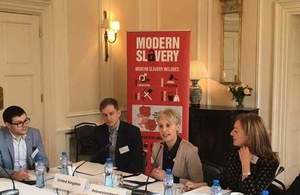Regional seminar in Sofia raises awareness about modern slavery
HMA Emma Hopkins OBE remarks on the need to tackle trafficking in human beings during a regional UK-led seminar.

HMA Emma Hopkins OBE addresses the workshop
On 22-23 February 2017 HMA Emma Hopkins OBE hosted a regional workshop in Sofia with law enforcers from the UK, Romania, Hungary, Serbia and Bulgaria, as part of а Modern Slavery campaign. She made the following address to the participants in the workshop:
More than 200 years ago William Wilberforce led Britain in the fight against slavery – opening the eyes of the world to the horrors and indignity of human servitude. Today, the world is still grappling with tackling modern-day forms of slavery. Within Europe, victims can be found in nail bars, car washes, in sheds, fields and brothels. Exploitation is taking place on a daily basis. The most recent estimates suggest that there are somewhere between 10,000 and 13,000 victims in the UK alone and 45 million across the world. These are vulnerable people who have travelled long distances believing they were heading for legitimate jobs to find they have been duped, forced into hard labour, and then locked up and abused. Innocent people are being forced into prostitution, often by people they thought they could trust. Recently, a 7-year-old boy was found and rescued in North London. He had been held as a domestic slave. Other children are raped, beaten and passed from abuser to abuser for profit.
This cause is a personal one for me. Over 10 years ago I wrote the UK’s first strategy on tackling trafficking in human beings. At that time I listened to an Asian woman who had been “swapped” by one organised criminal gang to another in a pub car park in Birmingham. The “price” was a green Ford Cortina car. I also heard from a young girl from a village in Eastern Europe who had been trafficked into prostitution. After the most horrendous ordeal she bravely gave evidence in court, without any special measures such as screens or video link whilst looking into the eyes of her traffickers. Her message was simple, you did this to me but you did not break me and I will survive it. Her two traffickers were sentenced respectively to 15 and 18 years imprisonment.
The current UK Prime Minister has made tackling this issue a very personal one. As Home Secretary, she oversaw the passing of a new Modern Slavery Act in the UK, the first legislation of its kind in Europe. The Act delivered tough new penalties to put slave masters behind bars where they belong, with life sentences for the worst offenders. It also created a vital policing tool to stop anyone convicted of trafficking from travelling to a country where they are known to have exploited vulnerable people in the past. The Act also delivered enhanced protection and support for victims and a world-leading transparency requirement on businesses to show that modern slavery is not taking place in their companies or their supply chains.
But, whilst having the right legislation is crucial, it is only one part of the jigsaw in stopping modern slavery. Modern slavery is a global phenomenon that knows no geographical boundaries and requires an international response. So, rather than chasing individual criminals in Britain as they are reported, we need a radically new, comprehensive approach to defeating this vile and systematic international business model at its source and transit. We need, more than ever, to work with international partners.
That is why the UK is stepping up its co-operation on this issue with our counterparts in government, law enforcement and civil society across Central and Eastern Europe. We are looking at how we can share our intelligence about those criminals who live off human misery, how we can respond to the brazen use of the internet to recruit and exploit victims, and how we can make sure that when victims are identified we support them in a way that doesn’t expose them to further risk or re-traumatisation. We are bringing those together at the front line of this war in workshops across the region.
We are keen to ratchet up our activity and focus, working hand in hand with our counterparts in the region to tackle the barriers to more effective action against traffickers. Those barriers include poor intelligence, corruption at borders, legislative deficiencies, limited understanding of the use of the internet by organised criminals and entrenched prejudices against potential victims leading to lack of appetite to investigate.
So we want to work with partners across the region. Slavery is not only found in the UK. It is found everywhere. We need to prevent it in countries of source, learn how to interdict it in countries of transit and be confident on identifying victims in countries of destination.
You can find out more about the workshop on our social media channels: Ambassador Hopkins’ Twitter account, Embassy’s Twitter account, Embassy’s Facebook page or by following #SlaveryIsNotModern.